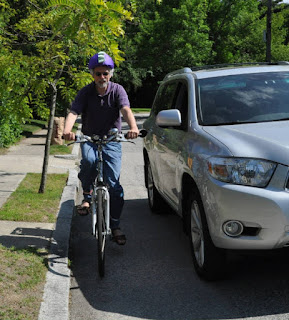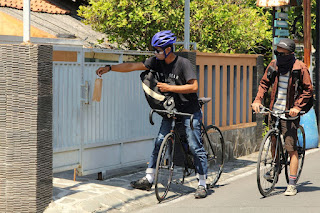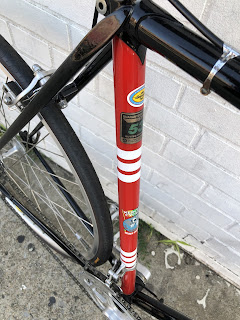Last week, I did four rides on four different bikes--all of them mine.
If you've been following this blog, you've seen three of them: Dee-Lilah, my Mercian Vincitore Special; Tosca, my Mercian fixed gear and Negrosa, my vintage Mercian Olympic. But I didn't mention what I rode to Point Lookout that Friday.
La-Vande, a Mercian King of Mercia, rose from the wreck of Arielle, the Mercian Audax I crashed last June. One of the few good things that came from that mishap--save for the support you, dear readers, showed--was a settlement to cover another bike.
I intended La-Vande to be the "winter" and "rainy day" version of Dee-Lilah, my Mercian Vincitore Special. So, I specified the same geometry but a slightly heavier tubing--Reynolds 725. And I'd asked for a different color scheme because I'm not trying to build a "Stepford" fleet.
Well, the frame was built with the same Reynolds 853 tubing as Dee-Lilah. And it was painted in the same colors, though La-Vande's lilac paint is slightly lighter. Grant at Mercian said it was probably a result of a "different batch" of paint. He apologized, but I wasn't upset, really. What La-Vande is, essentially, Dee-Lilah with less fancy (though still lovely) lug work--and some slightly less expensive components, most of which came from my parts bin.
Anyway, I pleased with the bike. It's a "younger sister" to Dee-Lilah. I figure that since she has a geometry and build I like, it doesn't hurt to have another bike like her.
Here is a list of La-Vande's specs.
Frame: Mercian King of Mercia, Reynolds 853 tubing.
Headset: Tange sealed bearing.
Wheels: Phil Wood hubs.
Mavic Open Pro 36 hole rims.
DT Competition spokes.
Tires: Continental Gator Skin folding 700 X28
Brakes: Shimano BR-R451
Tektro RL 340 levers
Mathauser Kool-Stop salmon pads
Crankset: Stronglight Impact, 170 mm, 48-34 chainrings
Bottom Bracket: Shimano UN-72, 68x107mm
Derailleurs: Shimano Ultegra 6500 rear
Shimano Dura Ace 7400
Dura Ace downtube levers
Cassette: Shimano 105 9 speed, 12-25
Chain: SRAM PC-971
Pedals: MKS Urban Platform with "basket" toe clips and Velo Orange toe straps
Handlebars: Nitto 177 "Noodle" 42 cm, wrapped with Newbaum's Eggplant-colored cloth tape
Stem: Nitto NP 110 mm
Seatpost: Nitto 65
Saddle: Brooks Professional
Accessories: Nitto M18 front rack, Zefal HPX pump, King "Iris" water bottle cages
In another post, I'll tell you about the bags on this bike--which I've also been using on some of my other bikes.






























